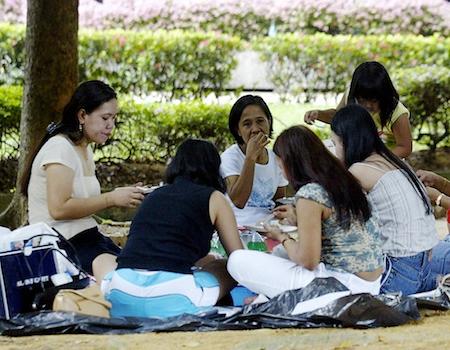One day off for maids? Too much for Singapore
Domestic helpers enjoy a picnic in the shade at ‘Gulung-gulung’ park in Singapore.
In Singapore, the middle-class expect life to include a live-in maid imported from a neighboring, less affluent country.
Most are expected to work seven days per week. So when a ministry official recently suggested guaranteeing just one day per week free for maids, many Singaporeans were dismayed.
"The slew of social problems that will result from a weekly day off is unthinkable," said one woman in a letter to Singapore's Straits Times.
Her defense of employers who essentially quarantine maids indoors might be satirical genius. But it's probably not.
"Do they not rest in the course of their work every day? … Are maids really that overworked? The many maids congregating and chatting away happily at my condominium on weekdays present a different picture."
Worse yet, she writes, "my previous maid met her boyfriend on her day off and even while we were at work."
A social life? The horror.
Maids in Singapore raise kids, cook food, clean, run errands and more for Singapore's Type A workaholic parents. Sometimes, when their kids are drafted into military service, the maids even carry their rucksacks.
And while maids are exempt from a state employee protection act — the kind that stipulates minimum holidays and days off — they are covered by a different law that forces employers to cover medical expenses and repatriation costs if they get pregnant.
The effect, explains Philip Bowring in an excellent New York Times op-ed, is that maids' bosses are terrified of letting them slip from the house and into the arms of a virile interloper.
So why turn risk turning them loose? After all, said the Straits Times letter writer, "my maid has more than enough time to rest daily when the kids are napping or when my older one is in kindergarten."
We want to hear your feedback so we can keep improving our website, theworld.org. Please fill out this quick survey and let us know your thoughts (your answers will be anonymous). Thanks for your time!
